![Climb Mount Toubkal Tips From Local Expert [30 Years Experience]](https://cdn.sanity.io/images/f5ovd1ei/production/583602f19db9ccc67b832053ccba8ca25e090833-1660x1067.webp?w=2800&h=1400&fit=crop&auto=format)
Climb Mount Toubkal Tips From Local Expert [30 Years Experience]
Want to climb Mount Toubkal, but need more info before taking the plunge?
You've come to the right place!
I went out to Morocco to catch up with the local ground crew who run our Mount Toubkal Trek and asked the Head Guide, Jamal for the inside scoop.
In this article you'll learn:
- The best time to climb Toubkal
- How hard is it to climb Mount Toubkal
- The kit you'll need for a Mount Toubkal climb
- Is it safe to do Mount Toubkal?
- A good itinerary for a Mount Toubkal trek
- A bit about Jebel Toubkal itself
- And loads more.
Let's get cracking!
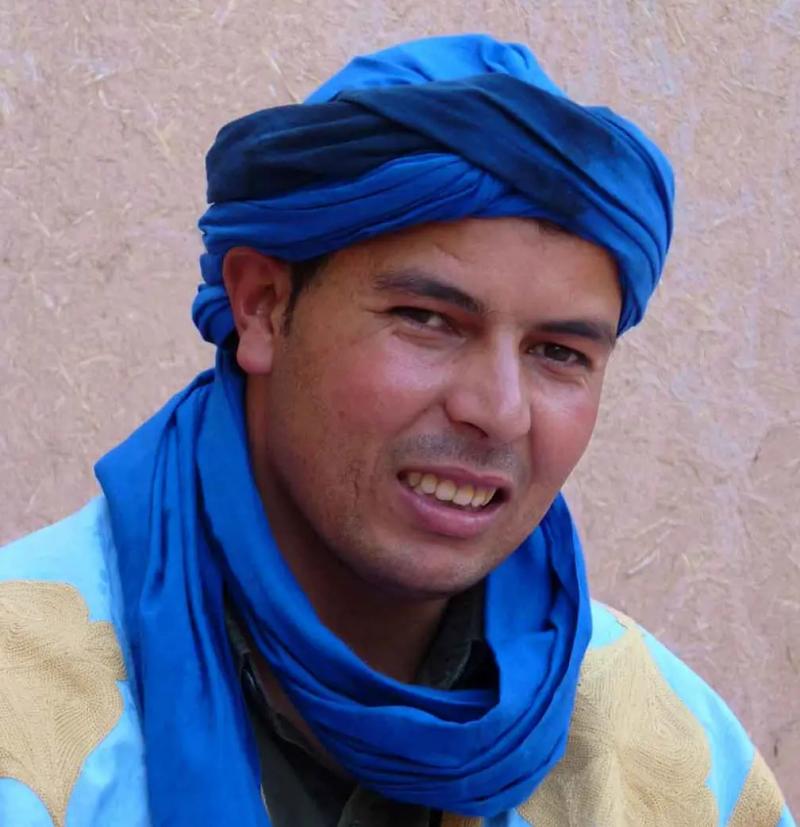
Jamal, what makes you an expert when it comes to climbing Mount Toubkal?
"I was born and bred in the High Atlas Mountains so know this place like the back of my hand. I've successfully guided thousands of people in these mountains over the year, of all shapes and sizes"
Jamal has a special connection to these mountains, particularly Mount Toubkal, after 30 years of experience guiding here
He's obsessed with creating memorable experiences for the guests he brings to this place. His love for this place is infectious.
He started his career as a muleteer and, over 3 decades, worked his way up to being the head honcho. Being a much respected local, he has the pick of the crop when it comes to hiring the rest of his team so he gets to only work with the best.
He's fluent in English, Arabic, and French. Oh, and he's fully trained in mountain rescue and wilderness first aid. So safe to say he knows his stuff!
Why hike Mount Toubkal?
"Mount Toubkal is a very special hike because it offers a decent challenge topping out at 4,167 meters but is still very doable. That's higher than many peaks in the Alps but we don't have the crowds."
"You also get a rich cultural experience, and the chance to try Moroccan food, sample a taste of local life, and meet the famously hospitable Berber people"
So Jebel Toubkal offers that sense of accomplishment once you've ticked it off but also doesn't require lots of previous mountain climbing experience. You can also do the trip in just 4 days meaning you don't eat too much into your precious annual leave.
The local food is exceptional and Jamal's guest house served one of the best tagines I sampled during my time in North Africa.
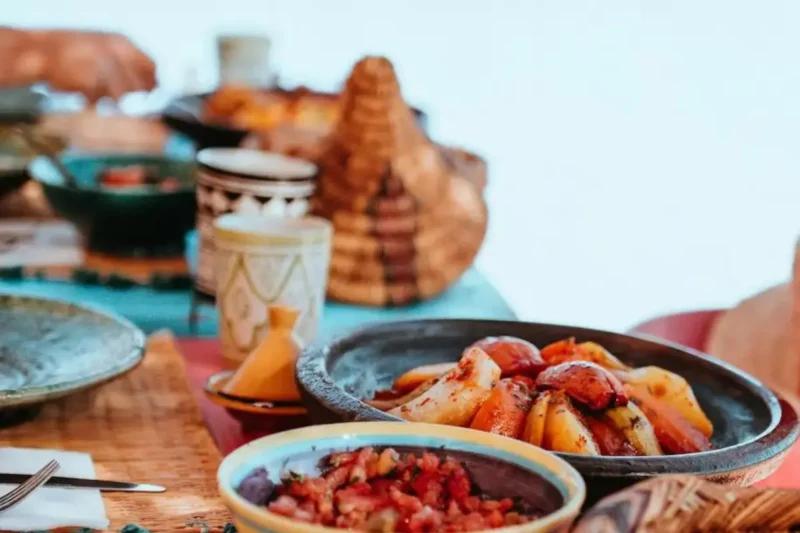
The surroundings are rugged and yet charming. The landscape feels much wilder than the peaks of Europe, never mind the UK, which gives you a real sense of adventure.
Finally, the early morning epic sunrise on summit day overlooking the Sahara Desert is also a major draw for climbing Toubkal.
Where is Mount Toubkal?
Mount Toubkal is located in the Atlas Mountains in Morocco, North Africa.
It's only about 60 kilometres from Marrakech city making it perfect for a quick adventure
Given a decent portion of the 60k is done off-road, the transfer from Marrakech takes about 90 minutes. Many people travel in a Land Cruiser like we did making for a super comfy trip.
However, the journey is (usually) possible in a standard car.
Your trek will start in the mountain village of Imlil which serves as the base for all local adventures. There are several outdoor shops, guest houses, and some nice local walks around here.
On a clear day, you'll have epic views of the Atlas Mountain range.
How technical is climbing Mount Toubkal? / Do I need climbing or scrambling experience?
"The high-ish altitude of Jebel Toubkal is often a bit intimidating for some of our guests. It's by far the highest mountain they've ever hiked. But climbing Mount Toubkal can be better thought of as hiking Mount Toubkal"
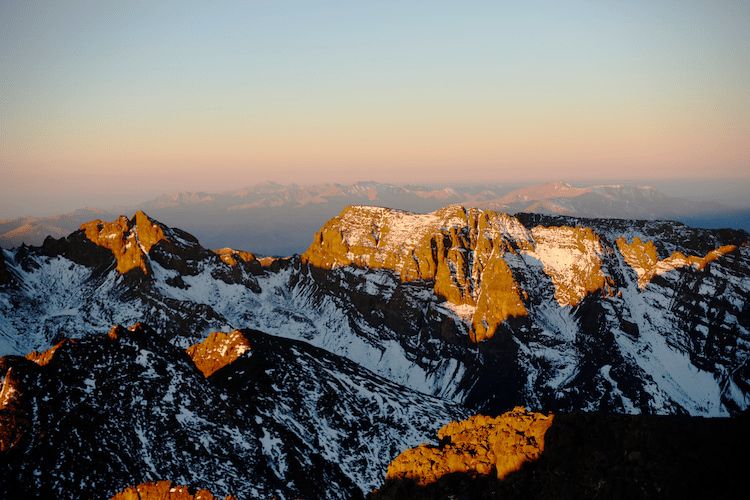
"It's just a long walk and you don't need any climbing or scrambling experience"
"When there's snow though you will need an ice axe and crampons"
"So long as you go with a reputable guide (going with a guide is now a requirement) and do some training you stand a good chance of summiting successfully"
Jamal explained that you certainly shouldn't underestimate your Mount Toubkal climb but the vast majority of people who travel with his team successfully summit.
If you're planning to do a winter ascent, knowing how to use an ice axe and crampons is desirable but not required. Your guide will be able to teach you and the basics are pretty straightforward.
When's the best time of year to climb Mount Toubkal?
"The best time for Toubkal trekking depends on what you're looking for"
"We climb Toubkal year round and have departures running almost every day of the year but different times of the offer offer different benefits"
"For fair weather, April to May and September to October are great options. The daytime temperature is usually between 20-25 degrees and the tracks are snow-free. Spring also sees the wildflowers bloom whilst Autumn offers amazing views as the leaves change colour"
"Summer is also doable but is obviously hotter. If you're looking for more adventure then a winter climb is the way to go (November - March)."
The great thing about Mount Toubkal is that there are options year-round. Just choose whatever trip you fancy and then book the season that suits you best.
What's the weather like when climbing Mount Toubkal?
"Mountain weather is notorious for changing quickly so it's impossible to say what the weather will be on any given day"
"But know that you'll be in for a big temperature change from Marrakech to Imlil to the summit"
"During the summer it can get very hot so the main concern is dealing with the heat"
"For winter ascents the early morning start on summit day means it's likely to be cold so you'll want to pay attention to the winter packing kit list"
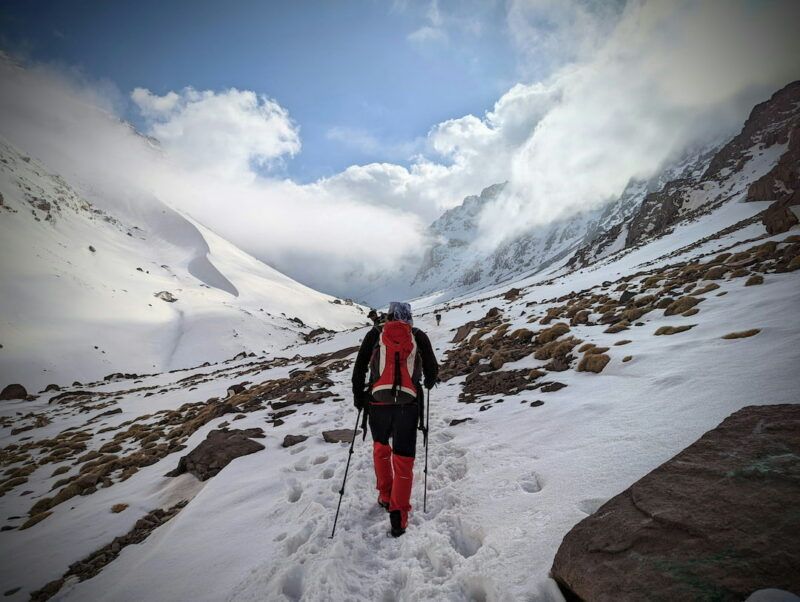
2024 was an unusually warm winter in Morocco. I visited in January but the snow had already melted.
Mount Toubkal presents an additional challenge than many mountains given how drastically the temperature change can be from the base to the summit.
I've added three great weather forecast services below so you can check the conditions just before your climb. Your guide will of course be doing that too...(hopefully)
Mountain Forecast Toubkal Weather
Yr Jbel Toubkal Long Term Weather Forecast
MeteoBlue 14 Day Weather Jbel Toubkal
What's a typical itinerary for a Toubkal climb?
“We offer all sorts of Toubkal itineraries ranging from 2 days to a week”
“Our most popular itinerary is the 4 day trip below because it packs a lot in but doesn’t feel rushed”
Day 1 - Transfer to Imlil
We'll collect you from Marrakesh Airport and whisk you off to the Berber village of Imlil at 1,740m where we'll spend the night at the lodge.
If you arrive earlier in the day, you can go and take a look around the fascinating city. We run two transfers from the airport, one at 11am and the other at 3pm.
These are included in the price. Or we can do a custom up at any time for a £10 surcharge.
You'll be able to take in your first glimpses of the spectacular High Atlas Mountains over dinner.
We'll stay at a lodge overnight.
Day 2 - Trek to Refuge de Toubkal
Our trek begins! Heading along the Mizane Valley, we'll pass the village of Aroumd with its backdrop of mountains, before climbing steadily to the shrine of Sidi Charamouch, a haven for pilgrims.
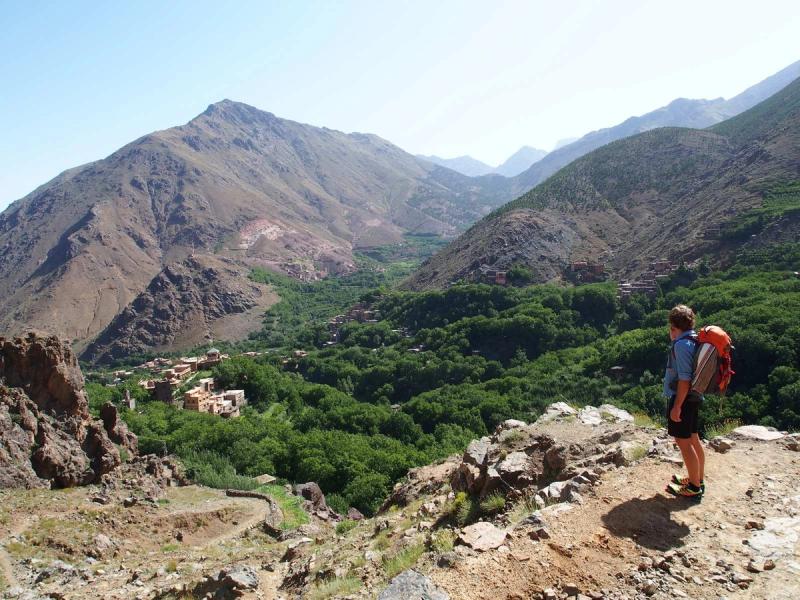
You have to try fresh orange juice from one of the stalls!
From here on the trail climbs gradually, zig-zagging its way up to the snow-line and the refuge at 3,206m and the basecamp for Toubkal.
We'll stay the night in the hut (or camp if needed) ready for our ascent tomorrow.
Day 3 - Jebel Toubkal Summit
This is the biggie!
We'll get an early start for our ascent of Jebel Toubkal, the highest mountain in North Africa! Our route takes us up the South Cirque, crossing the stream above the refuge.
Although the walking is relatively straightforward, the scree and the altitude can make it feel quite tough going, but we promise those views from the top will be worth it!
Once we reach the 4,167m summit marked by its iconic iron pillar you'll be blown away by the view.
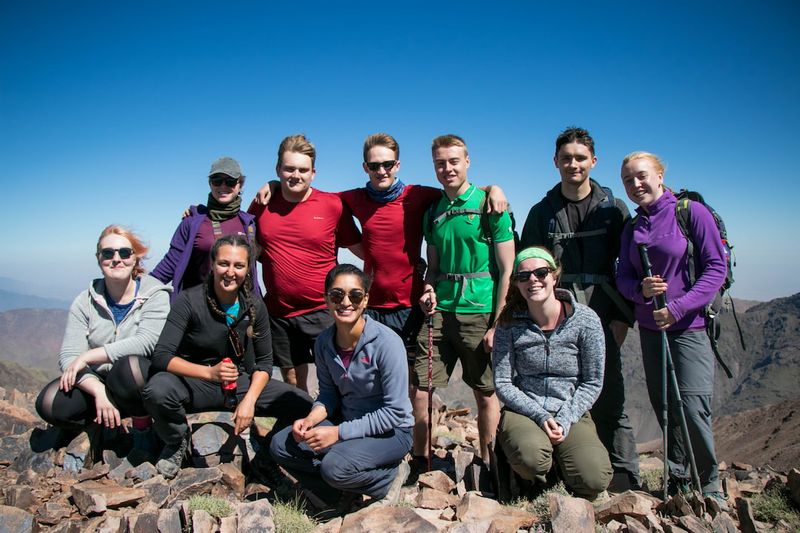
We'll be able to see right across the Marrakesh Plain to the High Atlas mountains of the north and, if we're lucky, as far as the Anti-Atlas and the Sahara Desert.
After a few summit selfies and taking in that gorgeous scenery, we'll retrace our steps back down the mountain, and down to Imlil, passing back through Sidi Charamouch.
Back at Imlil, we transfer to Marrakesh, where we stay the night in a basic but comfortable riad.
Day 4 - transfer to the airport and return home
We'll transfer you back to the airport (or the city centre if you prefer) and say farewell after an incredible adventure.
Tickling your fancy?
Secure your place at Mount Toubkal Trek
Or if you're looking for a winter trip Mount Toubkal Winter Trek
What training should I do to maximise the chances of a successful summit?
“Whilst the Toubkal summit is the highest peak most of our guests have ever reached, it’s still very doable.
“We guided a 10-year-old Call to Adventure guest in February 2024 who successfully completed the trek.”
Well done Victoria and dad Nik!
“The best training is that which is as similar to the trek as possible ie walking outdoors, uphill for several hours without much stopping”
The fitter you are the more you’ll enjoy the trek so it’s certainly worth putting in some training.
Having said that, pure determination is enough to get most people up and down even if they haven’t done much (any) training.
To maximise your chances of a successful summit, do multiple long walks each week for at least 8 weeks before the trip. Carry a small backpack with 5kg ish so you’re used to carrying some weight.
Try to find the biggest local mountains or hills you can and tackle those (anything over 4000 meters will be overkill but that’s not an issue for most readers).
Strength training in the gym is also great. Focus on multi-joint, compound, functional movements.
What kit do I need to climb Mount Toubkal?
“Having the right kit can make all the difference to both your enjoyment and safety so you must bring the right gear.”
“In winter you’ll need additional warm clothes, crampons, and an ice axe. We rent these to our guests so they don’t have to bring or buy them”
Clothing:
- Boots: lightweight summer walking shoes/boots or hiking boots for winter.
- Socks: several pairs of standard walking socks and a spare pair of warm mountaineering socks for summit day.
- Blister plasters (Compeed recommended).
- Quality walking trousers (e.g. Haglofs Rugged Mountain Pant).
- Waterproof over trousers.
- Wicking material underwear (2-3 pairs).
- 2 base layer shirts (one long-sleeved).
- Mid-layer fleece.
- Heavy outer fleece jacket or Primaloft insulated jacket (e.g., Rab Generator Jacket).
- Gore-Tex jacket.
- Woollen gloves for cooler days.
- Thermal gloves for summit day.
- Warm hat.
- Sunglasses.
- Sun hat.
Bags:
- Sturdy kit bag with waterproof liners for clothing, equipment (carried by mule from Imlil to the mountain hut).
- 15-25L day pack with waterproof liner for daily provisions: water, food, sunglasses, camera, jacket, etc.
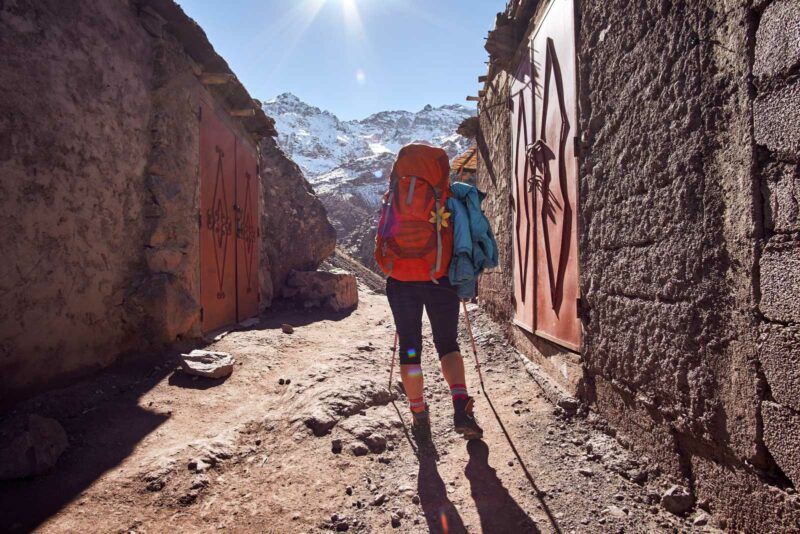
Sleeping:
- Summer, Spring, Autumn: 2-3 season sleeping bag rated to 5°C
- Winter: 4 season sleeping bag rated to -5°C
Other:
- Head torch with spare batteries.
- Sun protection (including for lips).
- Wash-bag and toiletries: antibacterial hand wash, toilet paper, travel fresh wipes/baby wipes, soap, toothbrush/toothpaste, sanitary towels, ear plugs.
- Towel.
- First aid kit: antiseptic cream, blister plasters (Compeed), headache tablets, Imodium, rehydration sachets, plasters, throat pastilles.
- Copy/picture of travel insurance document.
Passport. - Spare laces.
- Whistle.
- Water bladder / Platypus-type drinking system.
- Crampons and ice axe for winter (November to May)
Optional
- Walking poles (available for rent)
- Camera and spare batteries
A few additional quick tips:
Layer - when you're moving in the mountains in the cold weather it’s much better to wear more thin layers than a few thick ones. This allows you to get just the right temperature and to avoid sweating which can make you get very cold quickly when you stop.
Prioritise - bring everything you need not everything that ‘might be nice to have’.
New gear - be sure to use every bit of gear you’re taking with you before you go. Boots especially need to be well-worn in. There’s not much worse than boots that rub the minute you start walking.
Sunglasses - take sunnies even if you don’t think it will be sunny. These are especially important for winter trips as snow blindness is not much fun at all. Trust me…I won’t be forgetting mine again.
Can you get altitude sickness on Mount Toubkal?
“In all my years of guiding, I’ve never seen anyone struggle with seriously dangerous altitude sickness when hiking Mount Toubkal”
Jamal told me that whilst it’s possible to get altitude sickness here, it’s very unlikely to be an emergency given Toubkal's summit is 4,167 meters. And that’s the highest point in the Atlas Mountains.
So it’s important to acclimatise, stay hydrated, and take good care of yourself during the hike but altitude sickness isn’t a major concern, especially when compared to climbs like Mount Kilimanjaro or many Himalayan peaks.
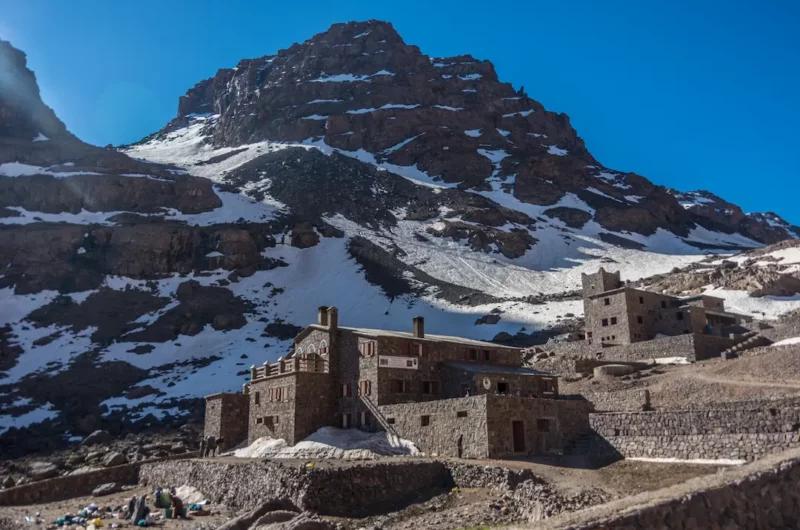
“Our guests stay the night at Toubkal Refuge, which is around 3,200 meters so they have a good chance to acclimatise”
Jamal cautioned that it’s still important to be aware of the signs of altitude sickness though, just in case. So look out for a constant headache, constant tiredness, shortness of breath, loss of coordination, chest pain, or feelings of nausea.
The good news is that symptoms can generally be alleviated just by descending back down the mountain to a lower altitude.
“Diamox is a medication used to help prevent altitude sickness. But given the risk is low for this trip, we don’t recommend it.”
What's the typical age range for people who climb Mount Toubkal?
“We get trekkers of all ages but most are between 22 and 55 years old”
“But as I said before, we took a 10-year-old girl and her father up in early 2024 safely and successfully”
Despite its height, Toubkal is a very accessible peak that most "normal people" can summit with a bit of training and determination.
Toubkal is certainly no walk in the park but trekkers of all ages should give it a go so long as you have the fitness.
I’ve seen blokes in their 60’s who are much fitter than most 30-year-olds. I also read about an 8-year-old lad successfully summiting.
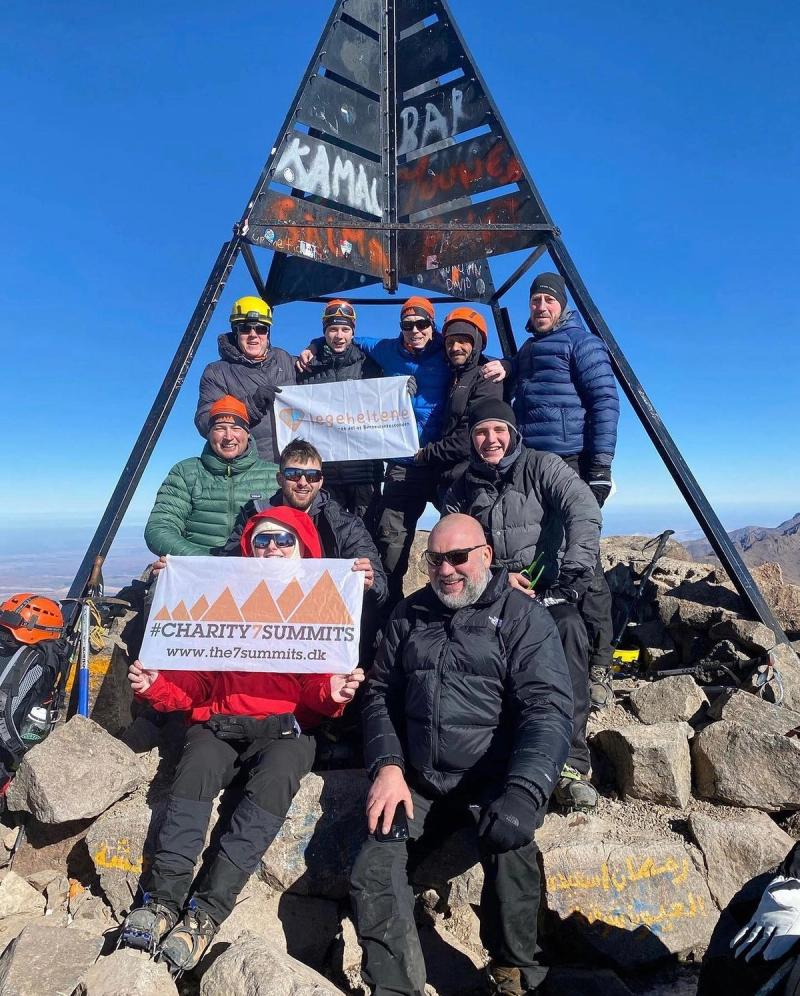
So don’t spend too much time thinking about whether you’re the ‘right age’ and think more about whether you are fit enough.
Do you need a guide to climb Mount Toubkal?
“Yes, It’s now mandatory to climb Toubkal with a guide”
“Hiring a good guide can really enrich your experience though so see this as a positive”
There’s certainly something exciting and even romantic about being in the mountains by yourself. Some of my best stories are when things went pear-shaped in the middle of nowhere.
After a few too many close calls though I’ve come to really appreciate the value a quality guide brings to a trip.
A decent guide will point out interesting waymarks, the local flora, and fauna, and give you a gentle push when needed.
Another great benefit of having a guide is not having to get your map or phone out all the time to check you’re going the right way. This means you get to immerse yourself in the trek fully.
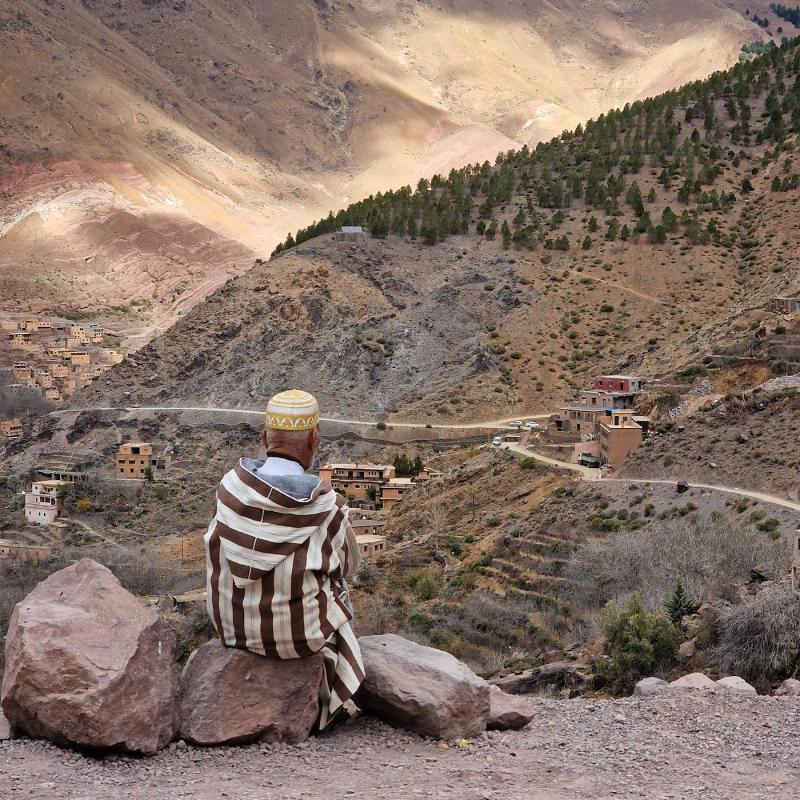
Learning more about the local culture from Jamal was another great plus so I would see having a local guide as a pro not a con. Moroccans are also a fun-loving bunch who love to share stories so you’re sure to be entertained.
What accommodation options are available for a Mount Toubkal Ascent?
“There are lots of good guest houses in Imlil. We use our own guesthouse there which is spacious, homely, and has great food, and a brilliant view”
“During your ascent, you have two options - stay in the refuge or camp”
“We generally recommend staying at the refuge as it’s comfy and a great place to rest up before the big ascent but some trekkers prefer to camp as it has more of an adventurous feel. It’s totally up to you”
We were well impressed with Jamal’s guest house. The view was incredible, as was the tagine!
You can also leave your stuff at the guest house if needs be but the mules can bring up anything you need for the ascent but don't want to carry.
How hard is it to climb Mount Toubkal?
“There are 2 things to think about when considering how hard a climb is - the technical difficulty and the level of fitness required”
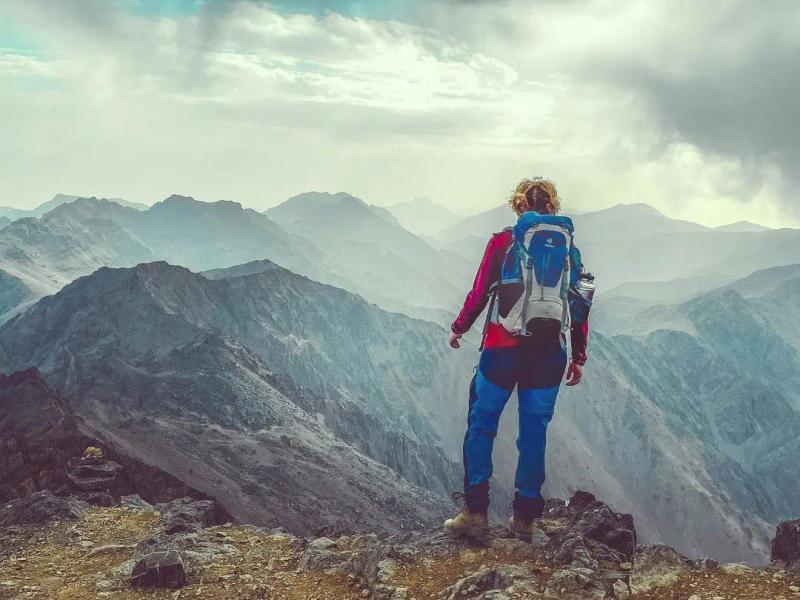
“Toubkal is a non-technical climb meaning no specific skills are required, although you’ll need to know how to use an ice-axe and crampons if you’re travelling in snowy conditions”
“The Toubkal trek is also on the lower end of the scale when it comes to fitness requirements for hiking mountains”. “It’s still a challenge though so don’t underestimate it. The ascent day is the longest with around 9-12 hours walking.”
If you’re a regular hillwalker you’ll be fine in terms of fitness. If not, be sure to get out on as many long walks as you can before the trip.
Overall, I’d say you need a moderate level of fitness to climb this one.
Can you tell me about some of the cultural highlights and famous Berber Hospitality?
“The Berbers are famous for being friendly and helpful. We talk to everyone and love to share stories”
“As a trekker, you’ll receive a warm introduction to local customs right at the start, with mint tea in the lodge in Imlil, a traditional Moroccan welcome signifying Berber hospitality”
How can I travel responsibly and what should I keep in mind?
“Responsible trekking means taking measures to minimise the impact we have on the natural environment of the High Atlas Mountains to ensure it is preserved for future generations.”
We need to do everything we can to take care of natural places and minimise our impact.
Normal Leave No Trace principles apply, as they do on any trip to the outdoors. However there’s also the cultural aspect to think about here.
Taking part in local traditions and contributing positively to the community’s economy is key.
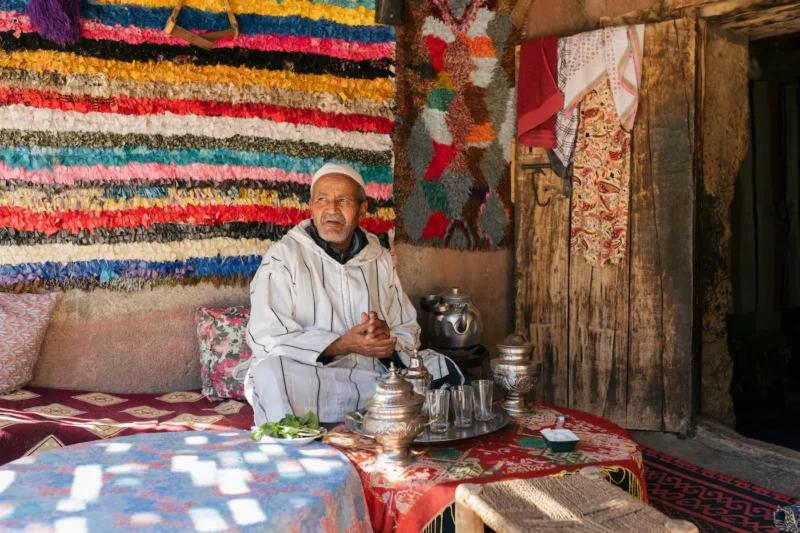
Marrakech in particular has more handicrafts than you can shake a stick at. Haggling is all part of the fun but try to pay a ‘fair price’ as opposed to always grinding them down to the rock-bottom price you might be able to get.
At Call to Adventure, we try to do our bit for example, we’ve been a member of 1% for the Planet since day 1. That means 1% of all our revenue (not profit) goes to fund leading environmental and social projects.
We also partner with guides who genuinely care for the planet and its people.
So you can travel safe in the knowledge that you’ve booked with environmentally and socially conscious partners.
How often do you run Toubkal trips?
“We run trips almost every day of the year other than Eid”
One of the benefits of booking a trip with Call to Adventure is the flexibility of departure dates.
You can also book up until just a few days before departure so last-minute bookings are welcome.
Ready to take the plunge?
See more about your Mount Toubkal Trek with Call to Adventure.
What's a typical group size when climbing Mount Toubkal
“You can find groups of all sizes depending on who you book with but we keep our groups to a maximum of 12 and often have fewer than that given we have departures almost every day”
We’ve found that having around 10 guests per group is the best mix of group camaraderie whilst also feeling like you have a variety of people to connect with.
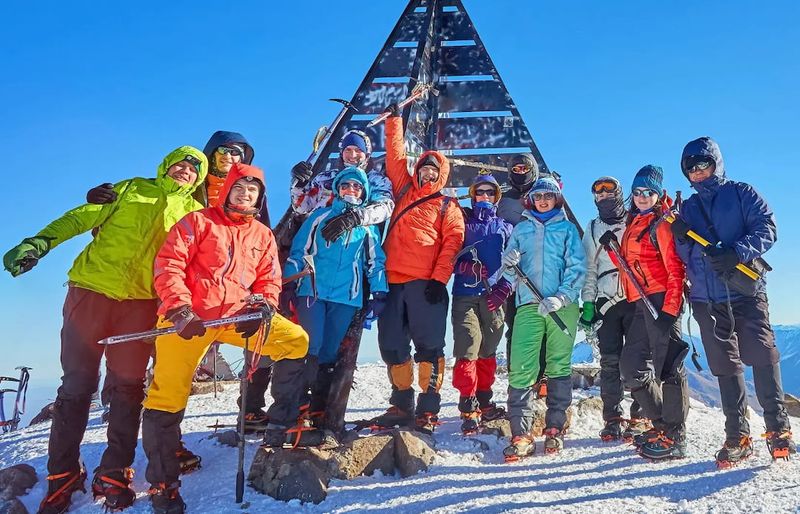
And of course, safety is the main concern with all our trips, hence keeping the group to no more than 12.
Can I rent gear for my Toubkal climb?
“Yes, we want to make things as easy as possible for guests so you can rent the following from us: sleeping bag, walking poles, boots, jacket, trousers, head torch, crampons and ice axes.”
You can also find several outdoor stores which also rent or buy gear like boots and trekking poles. Although the selection is quite limited and this is no Chamonix so temper expectations.
Do I need to tip the local team, and if so, how much?
“It’s not mandatory but almost all guests tip. They usually give 10-20% of the trip price”.
While not obligatory, it is highly encouraged as a gesture of gratitude towards your guides, cooks, and muleteers. Just give whatever you think is fair.
Is it better to book online first or just hire a guide in Marrakech?
“Booking a guide online versus just finding one when you get there mainly comes down to how much of your holiday you want to spend looking for a guide. And if you feel comfortable going with a local guide who hasn’t been verified by a third party.”
You can absolutely find a great local guide when you're here but you’re running a bit more risk.
Will they have availability?
Are they qualified and insured?
Do they really know what they are doing?
And do you want to spend time during your holiday organising it?
Opting to book online with an established company like Call to Adventure brings several advantages:
- Travel safely in the knowledge that you’re going with vetted and qualified guides who are experienced and first-aid-trained
- Book now, pay later, at no extra cost to you - pay all upfront or a small deposit today and spread the remaining payments out at no extra cost to you
- Flexible Booking - Free date changes up to 65 days before departure, no questions asked
- Feel good travel - 1% of all our revenue (not profits) goes to fund leading environmental and social projects
Any final words Jamal?
“Come to Morocco. Climb Toubkal. Have a great experience and enjoy this special country”
I couldn’t agree more.
Thanks, Jamal for all your time and expert insights.
Got your juices flowing?
Click the link to find out more and secure your space on a Mount Toubkal Trek
About the Author

George Beesley
Adventure Lover & Founder of Call To Adventure
George just bloody loves a bit of adventure! Imagine someone who not only hikes up mountains for breakfast but also bikes across continents. Got a case of wanderlust? This guy's been to over 50 countries and comes back with stories that'll make your grandma want to go bungee jumping.

